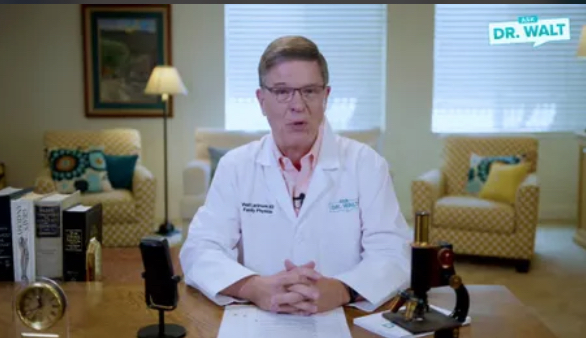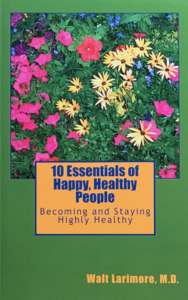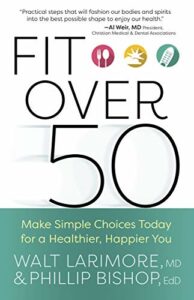Ask Dr. Walt 11 – Essential #5 – Avoid Loneliness Like the Plague OR The Essential of Relationships (Part 2)

The Writer’s Studio 14 – My Interview with Philip Yancey (Part 2)
July 13, 2023
“Vaccine News You Can Use” for Family Physicians – Summer 2023
July 19, 2023Ask Dr. Walt 11 – Essential #5 – Avoid Loneliness Like the Plague OR The Essential of Relationships (Part 2)
I shared in our last episode how love, social support, intimacy, security, safety, satisfaction, connectedness, and community all can affect our physical, emotional, and spiritual health. We’ll dig deeper into how important positive friendships and healthful family relationships are on your and your family’s health on today’s episode of Ask Dr. Walt.
From 2021-2022, I was honored to host a TV show on LiftableTV, “Ask Dr. Walt.” In this series, I’m explaining the 10 key habits or 10 essentials of happy, healthy people.
How important are relationships—how critical are positive friendships—on your physical, mental, and spiritual health? I think you’ll be shocked by what you learn more about this on today’s episode of Ask Dr. Walt where we’ll discuss Essential #5: Avoid Loneliness Like the Plague OR The Essential of Relationships (Part 2). You can click below to watch a video of the show, or I’ve put the show transcript at the end of the blog if you’d prefer that.
You can learn more about this topic in my best-selling book, 10 Essentials of Happy, Healthy People: Becoming and staying highly healthy or Fit over 50: Make Simple Choices for a Healthier, Happier You.
CLICK HERE FOR 10 E’S CLICK HERE FOR Fo50
Disclaimer: The Ask Dr. Walt show is designed for entertainment purposes to give information on various medical conditions, treatments, and procedures for your personal knowledge and to help you be a more informed consumer of medical and health services.
SHOW TRANSCRIPT
Avoid Loneliness Like the Plague — The Essential of Relationships
PART TWO
TEASE:
How important are relationships—how critical are positive friendships—on your physical, mental, and spiritual health? I think you’ll be shocked by what you learn more about this on today’s episode of Ask Dr. Walt.
OPEN:
Hi, everyone. I’m family physician Dr. Walt Larimore and I’m delighted you are taking the time today to join me in my home office as we continue our discussion about some of the essentials of becoming healthy.
We’ve begun reviewing my top 10 recommendations for you to consider on a path to become healthier physically, emotionally/mentally, relationally, and spirituality.
WE’VE ALREADY COVERED:
- The essential of true health—physical, emotional, relational, and spiritual
- The essential of self-care—how to be proactive in preventing disease
- The essential of reducing SADness—stress, anxiety, and depression (2 parts)
- The essential of forgiveness—how to practice acceptance and letting go (2 parts)
- The essential of relationships—avoid loneliness like the plague – Part One
TODAY WE’LL COVER:
Part Two of the essential of relationships
IN FUTURE SHOWS WE’LL COVER
- The essential of spiritual well-being—cultivate a positive spirituality
- The essential of a positive self-image—how to see yourself as your Creator sees you
- The essential of discovering your destiny—how to nurture your hopes and dreams
- The essential of personal responsibility and empowerment—how to become your own healthcare quarterback
- The essential of teamwork in healthcare—how to team up with winning healthcare professionals
In our last episode, I shared with you how love, social support, intimacy, security, safety, satisfaction, connectedness, and community all can affect our physical, emotional, and spiritual health.
It just makes sense. When we feel loved, nurtured, appreciated—when we’re valued, cared for, and supported—we are much more likely to be happier and healthier. People who avoid loneliness have a much lower risk of getting sick, and if they do become ill, they have a much greater chance of surviving. If you want to become a highly healthy person, then the simple fact is that your relationships matter. And they matter a lot.
Our Creator understands the problems that can result from being alone. In the first
book of the Bible, in Genesis 2:7, we are told, “God formed the man from the dust of the ground and breathed into his nostrils the breath of life, and the man became a living being.” Several verses later, in Genesis 2:18, God said, “It is not good for the man to be alone.”
The picture the Bible paints is that human beings truly live only insofar as we connect to to others with whom we can share life and love—with whom we can serve God, family, and community. In fact, the Biblical antidote to the poison of loneliness is Christian community.
This ancient record of wisdom is now being proven by modern research. We now know from medical studies that loneliness can cause psychiatric disorders and mental breakdowns, a wide variety of physical illnesses, and premature death.
But you couldn’t tell that to one of my patients from early in my practice days. Sam was a loner—and like most loners, he tended to be angry, hostile, and cynical. And alone—very alone. An ambulance brought Sam into the emergency room. Neighbor began to notice an unpleasant smell coming from his apartment. They normally didn’t bother Sam. He didn’t seem friendly, never returned any kindness they offered—even when they’d leave a small vase of flowers at his door or a delicious pie. Sam never sent a thank-you note to them, and he would return the vase or dishes to their front porch without even washing them. After the neighbor knocked for the fifth time, Sam finally opened the door. Both his appearance and his odor were horrid. He was confused and disheveled. His foot was wrapped in a rag—but soaked with infection. Sam seemed to stare past them. Then he began to laugh strangely—and suddenly he slammed the door. They called 911.
When I began to evaluate him, Sam was obese and filthy. He was what we doctors call “chronically dirty.” Every wrinkle had the rankest grime at its base. His toenails were thickened, long, and curled under, and his toe webs were nasty. But his right big toe was the worst. It was gangrenous. Sam was delusional, probably from the infection that was spreading through his body. His blood pressure and blood sugar were both way off. We worked fast and hard to stabilize him, but his diseases beat us to the finish line.
“Code Blue, Emergency Room!” was announced over the hospital public address system while I was looking at Sam’s X rays in the radiology department. I sprinted to the ER. Sam’s heart had started to fibrillate, beating rapidly and erratically, and then he had a seizure. We did CPR for quite some time—but to no avail.
When I filled out his death certificate, I wrote that the cause of death was a heart attack exacerbated by obesity, hypertension, arteriosclerosis, tobacco abuse, alcoholism, diabetes, sepsis, and gangrene. But if truth be told, Sam died of loneliness. He was only twenty-nine years old but was what I call “a pathological loner.” Sam was an extreme example that drives home the point that loneliness can kill.
Highly healthy people avoid loneliness like the plague. So, with that introduction, let’s get to more of your questions on avoiding loneliness like the plague.
=================
Well, to explore the topic of the health dangers of loneliness, let’s take some of the questions from our viewers.
This first question is from Mike in Bristol, Tennessee. “Dr. Walt, can’t people be lonely even when they are around other people?”
Great question, Mike. Absolutely. In fact, Dr. John Cacioppo, one of the foremost authorities on loneliness, writes, “The number of people in your life does not inoculate you from experiencing loneliness. Rather, it’s the feeling of being lonely that places the brain and body at risk.” In fact, “Cacioppo equates feeling lonely with feeling hungry. We compromise our survival and well-being when either is ignored.”[1]
If you ignore hunger, you starve. The same is true of our need for belonging. If you are currently lonely, recognize the dangers of prolonged loneliness. If you feel lonely, reach out to others. Don’t wait for your phone or doorbell to ring. It is your responsibility—and privilege—to involve yourself in others’ lives. At the end of today’s program, I’ll give you some tips on how to do this.
Darla from Tampa asks, “I’m a loner—an introvert. I love solitude—especially with God. Is it dangerous for me not to have a bunch of friends?”
That’s a unique question for sure. Well, of course, for those of us who are followers of Jesus believe Him when He claims in John 14:6, “I am the way and the truth and the life. No one comes to the Father except through me.” And the Apostle John assures us in 1 John 5:11-13, “And this is the testimony: God has given us eternal life, and this life is in his Son. Whoever has the Son has life; whoever does not have the Son of God does not have life. I write these things to you who believe in the name of the Son of God so that you may know that you have eternal life.” So, for us, an abundant life now and an eternal life are both dependent upon a personal relationship with God. There is no more important friendship than friendship with God.
But medical research shows that our physical and emotional health can both be improved with strong, positive relationships with God and people. Let me give you an example. University of Texas researchers evaluated patients who had undergone open-heart surgery. They found those who were lonely had a fourfold increase in the risk of premature death. But, on top of that, those who reported that they did not draw strength from a faith in God were three times more likely to die within six months after surgery. Worse yet, these risks were additive, as those who did not have a close personal relationship with one or more true friends and a close personal relationship with God were more than seven times as likely to die within six months of their surgery.[2]
I like to think of it this way: Loneliness is a solitary boat floating in a sea of lonesomeness and self-enforced seclusion. Solitude is a solitary boat floating in a sea of possible companions and self-directed connections.
Loneliness is wishing someone was there. Solitude is joy in aloneness. Nevertheless, good friends keep our solitude safeguarded from the potential anguish of aloneness or languishing in loneliness.
Annette in Marian, Indiana, writes in, “If a person, like me, is an introvert and enjoys time alone, or if someone lives by themselves, is that a form of loneliness? Is our health at risk?”
Annette, this is a very insightful question I should have explained earlier in the show. It’s important to understand what I do NOT mean by loneliness. For example, many people who are introverts may live by themselves or spend the majority of their time away from the company of other people and be perfectly healthy. In fact, natural introverts are people who get their energy from being able to spend time thinking and reading in solitude. But, by and large, healthy introverts also enjoy and appreciate close relationships.
My friend, Dr. Reg Finger, a physician and public health expert at Indiana Wesleyan University writes, “As long as one has regular meaningful contact with others who care and value you, you might not suffer loneliness even if living by oneself. On the other hand, a person can feel very much ‘alone in a crowd.’ Being with all kinds of people in superficial ways all day long can be even more toxic than solitude.”[3]
Jan in Atlanta asks, “I lost my spouse to cancer earlier this year. As a result, I’m now living by myself. Are you saying this could be harmful to my health?
Jan, it depends on whether, on one hand, you’re experiencing the negative emotion of loneliness, or on the other hand, the potentially healthy state of solitude and healing. I look at it this way: loneliness can be the negative emotion that results from the pain of being alone while solitude can be a positive emotion that results from the glory of being alone.
Does this make sense? Said another way, loneliness is different than isolation and solitude. Loneliness is a harmful state where the positive connections we need with God and other people are greater than the connections we have. The negative consequences of the plague of loneliness are born in this gap.
Tim in Washington, DC, observes, “I work in policy creation with the U.S. Congress. I understand that there is legislation in England to encourage physicians to recognize and react to loneliness. Do you know anything about this?”
Tim, I’m aware of that the government of Great Britain is responding to what they consider to be a crisis of loneliness is by implementing a practice called “social prescribing.” By 2023, all doctors in England will be able to “refer patients experiencing loneliness to community activities and voluntary services” as an alternative to prescribing medication. According to the legislation, “Such activities could include cooking, dance classes, walking clubs, or art groups, all of which will receive funding from the government and are intended to reduce demand on the NHS and improve patients’ quality of life.”[4]
Eloise in Missoula, Montana, asks, “I’m single and my dogs are wonderful friends. Do they count?”
I don’t think there’s any doubt that pets can help dispel loneliness. And, if you don’t want to own a pet, follow my friend Cynthia’s example and volunteer at an animal shelter on weekends. The big smile I see on her face every time she talks about her work at the shelter leads me to believe that her weekly “dose” of puppy love is making her more highly healthy. But as important as pets can be, it’s still important to have one or two close people friends to most effectively immunize yourself against the plague of loneliness.
Jack in Middletown, Connecticut, asks, “This information on loneliness is a gamechanger for me. I direct our church outreach program and wonder what I can do to help our members who might be lonely?”
Jack, just begin asking around. Take a survey. Let members know that you and your team are available to help. Even a small outreach can have a huge impact. Let me give you an example.
Psychologists at McGill University took a group of heart attack survivors who were being discharged from the hospital and assigned them to one of two groups. Both groups received the best heart care from physicians. However, one group, also received a monthly phone call from the researchers. If the researchers sensed any psychosocial problem, a specially trained nurse was dispatched to the patient’s home. Just this simple relationship enhancement resulted in a 50 percent reduction in the patients’ death rate after one year. Providing just one support person who called once a month but who was available to help if any help was needed—just one caring, helping person—contributed to longer lives and more happiness for the patients studied.[5]
Imagine the potential impact if every church provided this kind of caring service for its worshipers! Can you imagine the results if hospitals routinely provided this service for the patients they discharge?
======================
Let me end with MY PRESCRIPTION FOR TODAY. For those of you who are Christ followers, I highly recommend you invest in relationships with Christian friends—a healthy Christian community. Debra Fileta writes, “The concept of Christian community is such an important part of love, because it’s within the context of relationships that we have the opportunity to express and receive love.”[6] Debra suggests ten reasons for why it’s critical to be in relationship with other believers that I’d like to leave you with today:[7]
Christian Community . . .
- Challenges you to be more like Jesus (Heb 10:24-25).
- Meets practical needs (Acts 2:42-47).
- Carries you emotionally (Gal 6:2).
- Reveals your gifts and talents (Eccl 4:9-12).
- Opens your eyes to the needs of others (1 Thes 5:14).
- Empowers your relationship with God (Prov 27:17).
- Helps meet our need for love (Prov 17:17).
- Offers opportunities for confession which leads to healing (James 5:16).
- Teaches you to work through conflicts (1 Cor 1:10).
- Gives you the chance to forgive (1 Pet 4:8-11).
In short, Christian community is critical in living out an abundant, satisfying, and healthful life—it is the environment in which the terrible disease of loneliness can be cured.
If you are currently lonely, or know someone who is, I hope this program has helped you recognize the dangers of prolonged loneliness. If you feel lonely, reach out to others. Involve yourself in others’ lives. We can all fight against loneliness by engaging in random acts of kindness. Think of positive relationships with other people as your personal Garden of Eden—a orchard that can bud with the fruit of great relationships—a potential paradise that needs to be tended daily—and then do it!
=================
END OF THE SHOW
Time’s up for today. To continue your journey to becoming a highly healthy person, I hope you will fill some of this program’s prescriptions for building stronger and healthier relationships. As you do, you will, in turn, avoid loneliness like the life-threatening plague it is.
If you want more information on this health essential, you may be interested two of my best-selling books: Fit over 50: Make Simple Choices for a Healthier, Happier You and 10 Essentials of Happy, Healthy People: Becoming and staying highly healthy. You can find them at DrWalt.com. Just click on the tab that says books.
C. S. Lewis wrote, “Look for yourself, and you will find in the long run only hatred, loneliness, despair, rage, ruin, and decay. But look for Christ, and you will find Him, and with Him everything else thrown in.” So, next time we’ll be continuing our look at the 10 Essentials of Healthy, Happy People by discussing The Essential of Spiritual Well-being and How to Cultivate a Positive Spirituality. I’d love to hear from you. What questions do you have about the association of your spiritual health to you physical, emotional/mental, and relational health? Just send them in to DrWalt@Liftable.TV along with any other general health questions you might have. That’s DrWalt@Liftable.TV
So, until our next visit, “Dear friend, I pray that you may enjoy good health and that all may go well with you, even as your soul is getting along well.”
I’m Dr. Walt Larimore and I look forward to seeing you for my next episode of “Ask Dr. Walt.”
[1] tinyurl.com/ybtnyv3y
[2] Oxman, T.E. “Lack of social participation or religious strength and comfort as risk factors for death after cardiac surgery in the elderly.” Psychosomatic Medicine 57 (1995): 5–15. tinyurl.com/y6vbtbrx.
[3] Finger, Dr. Reginald. Personal communication. October 16, 2018.
[4] tinyurl.com/y89uhcon
[5] N. Frasure-Smith and R. Prince, “Longterm follow-up of the Ischemic Heart Disease Life Stress Monitoring Program,” Psychosomatic Medicine (1989): 51(5):485–513.
[6] tinyurl.com/y8gdw2f5
[7] tinyurl.com/y8gdw2f5
Disclaimer: The “Ask Dr. Walt” show is designed for entertainment purposes to give information on various medical conditions, treatments, and procedures for your personal knowledge and to help you be a more informed consumer of medical and health services.
© Copyright WLL, INC. 2023. This blog provides healthcare tips and advice that you can trust about a wide variety of general health information only and is not intended to be a substitute for professional medical advice, diagnosis, or treatment from your regular physician. If you are concerned about your health, take what you learn from this blog and meet with your personal doctor to discuss your concerns.








